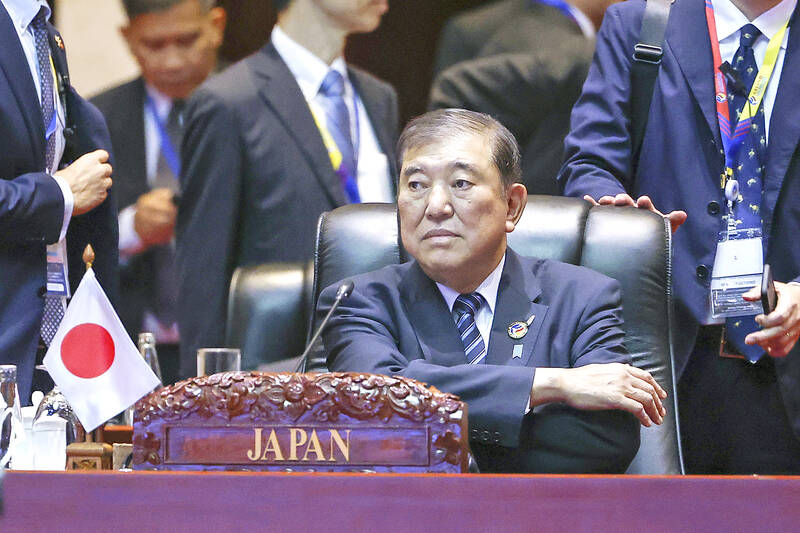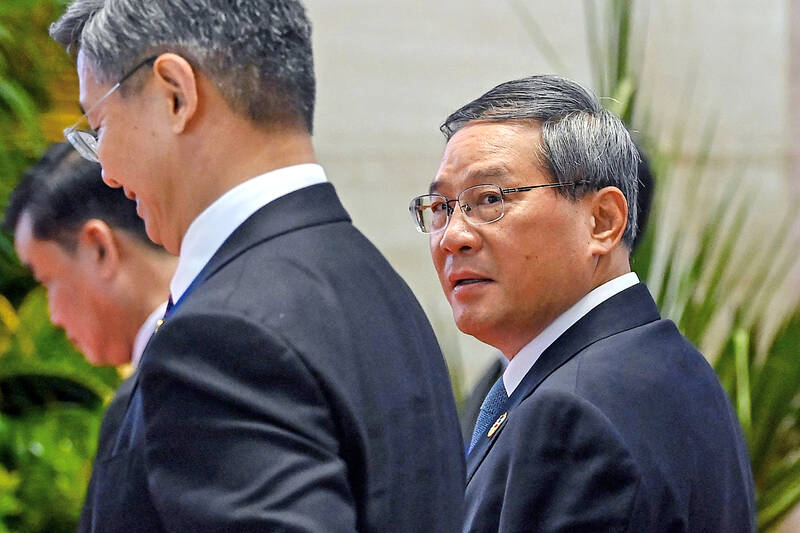The US is concerned about China’s “increasingly dangerous and unlawful” activities in the disputed South China Sea, US Secretary of State Antony Blinken told ASEAN leaders yesterday during an annual summit, and pledged that Washington would continue to uphold freedom of navigation in the region.
The 10-member ASEAN meeting with Blinken followed a series of confrontations at sea between China and ASEAN members Philippines and Vietnam.
“We are very concerned about China’s increasingly dangerous and unlawful activities in the South China Sea which have injured people, harm vessels from ASEAN nations and contradict commitments to peaceful resolutions of disputes,” said Blinken, who is filling in for US President Joe Biden, in his opening speech at the US-ASEAN summit. “The United States will continue to support freedom of navigation, and freedom of overflight in the Indo-Pacific” region.

Photo: EPA-EFE
Chinese and Philippine vessels have clashed repeatedly this year, and Hanoi last week said that Chinese forces assaulted Vietnamese fishermen in the sea.
China has also sent patrol vessels to areas that Indonesia and Malaysia claim as exclusive economic zones.
The US has warned that it is obligated to defend the Philippines — its oldest treaty ally in Asia — if Filipino forces, ships or aircraft come under armed attack, including in the South China Sea.

Photo: AFP
Philippine President Ferdinand Marcos Jr told summit leaders on Thursday that his country “continues to be subject to harassment and intimidation” by China.
It was “regrettable that the overall situation in the South China Sea remains tense and unchanged” due to China’s actions, Marcos said, adding that they violated international law.
He has called for more urgency in ASEAN-China negotiations on a code of conduct to govern the South China Sea.
Malaysia, which is to take over the rotating ASEAN chair next year, is expected to push to accelerate talks on the code of conduct.
Officials have agreed to try and complete the code by 2026, but talks have been hampered by issues including disagreements over whether the pact should be binding.
Russian Minister of Foreign Affairs Sergei Lavrov called US actions in Asia “destructive,” accusing Washington of being behind a “militarization” of Japan and attempting to turn other countries against Russia and China.
“The destructive character of US actions in this part of the world is obvious,” Lavrov told reporters.
Asked about Japan’s proposal for a NATO-style Asian pact, Lavrov said: “Ideas about creating military blocs always carry risks of confrontation that could escalate.”
Western countries wanted to exploit their ties with ASEAN “above all against the interests of Russia and China,” he said.
In Tokyo, the Japanese Ministry of Foreign Affairs said that Japanese Prime Minister Shigeru Ishiba called for a “full explanation” of an airspace intrusion by a Chinese military aircraft in his first face-to-face meeting with Chinese Premier Li Qiang (李強).
“Prime Minister Ishiba reiterated Japan’s serious concerns about the situation in the East China Sea, including ... the intensification of Chinese military activities in areas surrounding Japan,” the ministry said yesterday after Thursday’s meeting on the sidelines of the ASEAN summit.
In particular, Ishiba said he wanted “a full explanation of the intrusion into Japan’s territorial airspace” by a Chinese military aircraft in August.
Ishiba, on his first official trip abroad since taking office last week, also highlighted the passage of China’s Liaoning aircraft carrier between two Japanese islands near Taiwan for the first time last month.
Soon afterward, a Japanese warship sailed through the Taiwan Strait for the first time, drawing an angry response from Beijing.
Ishiba, 67, also urged China to ensure the safety of Japanese nationals after the fatal stabbing of a Japanese schoolboy in Shenzhen, China, last month, and other recent incidents.
He also “expressed Japan’s serious concerns about the situations in the South China Sea, Hong Kong, Xinjiang Uyghur Autonomous Region and others,” and stressed the importance of peace and stability in the Taiwan Strait, the ministry said.
Ishiba and Li agreed on the need for “constructive and stable” ties and said they would “maintain multi-layered communications between Japan and China at all levels, including at the summit level,” it added.
Additional reporting by AFP

POLITICAL PRISONERS VS DEPORTEES: Venezuela’s prosecutor’s office slammed the call by El Salvador’s leader, accusing him of crimes against humanity Salvadoran President Nayib Bukele on Sunday proposed carrying out a prisoner swap with Venezuela, suggesting he would exchange Venezuelan deportees from the US his government has kept imprisoned for what he called “political prisoners” in Venezuela. In a post on X, directed at Venezuelan President Nicolas Maduro, Bukele listed off a number of family members of high-level opposition figures in Venezuela, journalists and activists detained during the South American government’s electoral crackdown last year. “The only reason they are imprisoned is for having opposed you and your electoral fraud,” he wrote to Maduro. “However, I want to propose a humanitarian agreement that

ECONOMIC WORRIES: The ruling PAP faces voters amid concerns that the city-state faces the possibility of a recession and job losses amid Washington’s tariffs Singapore yesterday finalized contestants for its general election on Saturday next week, with the ruling People’s Action Party (PAP) fielding 32 new candidates in the biggest refresh of the party that has ruled the city-state since independence in 1965. The move follows a pledge by Singaporean Prime Minister Lawrence Wong (黃循財), who took office last year and assumed the PAP leadership, to “bring in new blood, new ideas and new energy” to steer the country of 6 million people. His latest shake-up beats that of predecessors Lee Hsien Loong (李顯龍) and Goh Chok Tong (吳作棟), who replaced 24 and 11 politicians respectively

Young women standing idly around a park in Tokyo’s west suggest that a giant statue of Godzilla is not the only attraction for a record number of foreign tourists. Their faces lit by the cold glow of their phones, the women lining Okubo Park are evidence that sex tourism has developed as a dark flipside to the bustling Kabukicho nightlife district. Increasing numbers of foreign men are flocking to the area after seeing videos on social media. One of the women said that the area near Kabukicho, where Godzilla rumbles and belches smoke atop a cinema, has become a “real

‘WATER WARFARE’: A Pakistani official called India’s suspension of a 65-year-old treaty on the sharing of waters from the Indus River ‘a cowardly, illegal move’ Pakistan yesterday canceled visas for Indian nationals, closed its airspace for all Indian-owned or operated airlines, and suspended all trade with India, including to and from any third country. The retaliatory measures follow India’s decision to suspend visas for Pakistani nationals in the aftermath of a deadly attack by shooters in Kashmir that killed 26 people, mostly tourists. The rare attack on civilians shocked and outraged India and prompted calls for action against their country’s archenemy, Pakistan. New Delhi did not publicly produce evidence connecting the attack to its neighbor, but said it had “cross-border” links to Pakistan. Pakistan denied any connection to